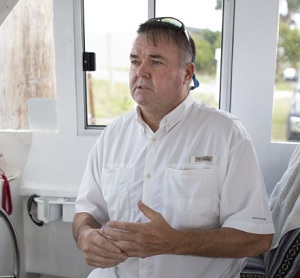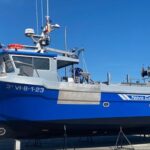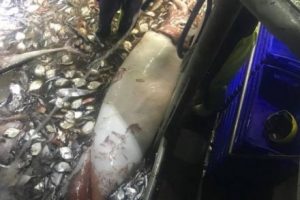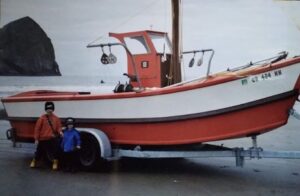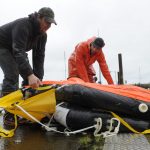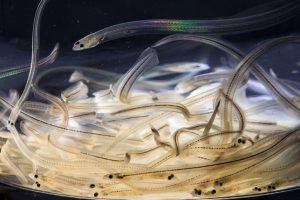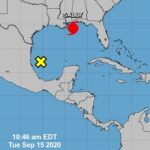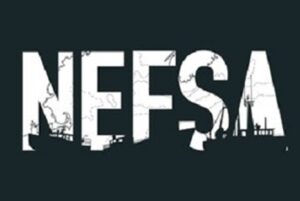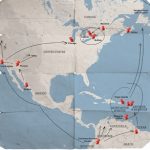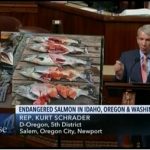Tag Archives: Glenn Skinner
COMMENTARY: It’s time for collaborative management of North Carolina fisheries
 After two weeks of fisheries meetings and numerous comments from stakeholders, it’s clear that our current system of fisheries management leaves much to be desired. Since the General Assembly passed legislation in 2010 requiring overfishing to be ended in two years, or less, and sustainable harvest to be achieved within 10 years (with management that has at least a 50% probability of success), we have seen nothing but declining harvest limits across every fishery. This law – pushed by the Coastal Conservation Association (CCA) and then DMF Director Louis Daniel – has made North Carolina the most restrictive state in the Nation when it comes to fisheries management. Even California has less restrictive mandates! more, >>CLICK TO READ<< 07:17
After two weeks of fisheries meetings and numerous comments from stakeholders, it’s clear that our current system of fisheries management leaves much to be desired. Since the General Assembly passed legislation in 2010 requiring overfishing to be ended in two years, or less, and sustainable harvest to be achieved within 10 years (with management that has at least a 50% probability of success), we have seen nothing but declining harvest limits across every fishery. This law – pushed by the Coastal Conservation Association (CCA) and then DMF Director Louis Daniel – has made North Carolina the most restrictive state in the Nation when it comes to fisheries management. Even California has less restrictive mandates! more, >>CLICK TO READ<< 07:17
NCFA Weekly Update for August 19, 2024 – Here we go again!
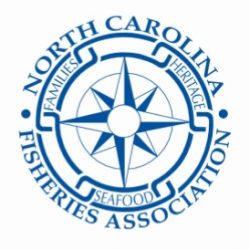 Instead of giving you the upcoming Marine Fisheries Commission (MFC) meeting details like I would normally do this week, I want you to read one of our previous Updates that our Executive Director Glenn Skinner wrote on March 7, 2022. After the Division of Marine Fisheries (DMF) announced their initial management recommendations for speckled trout last week Glenn’s words are even more relevant now than they were then. Shortly after the February 2022 meeting of the Marine Fisheries Commission (MFC) the Department of Environmental Quality (DEQ) made a social media post explaining how Amendment 3 to the Southern Flounder FMP would impact recreational flounder fishing in NC. In response to the post, David Sneed, Executive Director of the NC CCA made the following comment. David Sneed “Let’s not forget how we got here… more, >>CLICK TO READ<< 07:31
Instead of giving you the upcoming Marine Fisheries Commission (MFC) meeting details like I would normally do this week, I want you to read one of our previous Updates that our Executive Director Glenn Skinner wrote on March 7, 2022. After the Division of Marine Fisheries (DMF) announced their initial management recommendations for speckled trout last week Glenn’s words are even more relevant now than they were then. Shortly after the February 2022 meeting of the Marine Fisheries Commission (MFC) the Department of Environmental Quality (DEQ) made a social media post explaining how Amendment 3 to the Southern Flounder FMP would impact recreational flounder fishing in NC. In response to the post, David Sneed, Executive Director of the NC CCA made the following comment. David Sneed “Let’s not forget how we got here… more, >>CLICK TO READ<< 07:31
NCFA WEEKLY UPDATE for June 24, 2024
 MD, VA and NC Public Hearing on Atlantic Cobia Draft Addendum II – The Atlantic States Marine Fisheries Commission (ASMFC) staff will be presenting Atlantic Cobia Draft Addendum II and having opportunity for public comment. This Draft Addendum considers recreational allocation, harvest target evaluation, and the timeline for setting management specifications. Although this may not directly apply to all readers, I think it is an interesting exercise that will apply to many more of our fisheries in the future. more, >>CLICK TO READ<< 11:19
MD, VA and NC Public Hearing on Atlantic Cobia Draft Addendum II – The Atlantic States Marine Fisheries Commission (ASMFC) staff will be presenting Atlantic Cobia Draft Addendum II and having opportunity for public comment. This Draft Addendum considers recreational allocation, harvest target evaluation, and the timeline for setting management specifications. Although this may not directly apply to all readers, I think it is an interesting exercise that will apply to many more of our fisheries in the future. more, >>CLICK TO READ<< 11:19
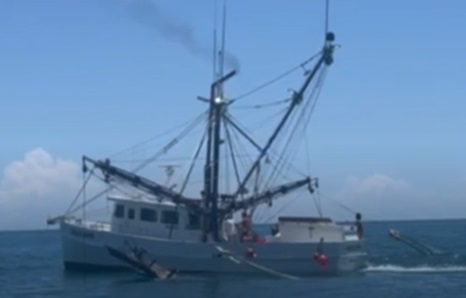
North Carolina: Debates over ending inshore trawling to protect marine life
For commercial fishermen like Thomas Smith, who works in the Pamlico Sound, shrimp trawling is essential for their livelihood. “Most of our income comes between July and November while working on inshore waters,” says Smith. He said that keeping shrimp trawling operations only in the ocean would only be viable for about two months each year, potentially devastating his business. “It would put me out of business,” he adds. Tim Gestwicki, CEO of the NCWF, supports ocean shrimp trawling but insists that inshore trawling must be stopped to protect juvenile fish species, such as the Southern flounder. “It’s time for us to catch up with the times and quit squandering our resources unnecessarily,” said Gestwicki. Video, more, >>CLICK TO READ<< 09:37
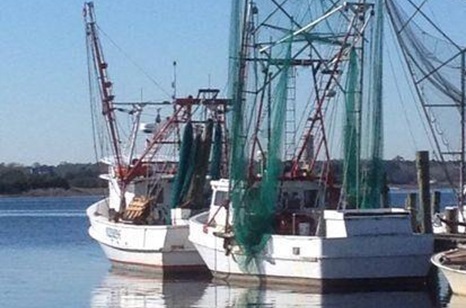
N.C. Wildlife Federation calls for inshore shrimp trawling ban, commercial fisheries lobbying group responds
N.C. Wildlife Federation CEO Tim Gestwicki called on state legislators Tuesday to “put a stop to inshore shrimp trawling as soon as possible.” In a news release, Gestwicki said the call is in response to the N.C. Division of Marine Fisheries canceling the recreational southern flounder season for 2024. Glenn Skinner, executive director of the N.C. Fisheries Association, a Morehead City-based trade and lobbying group for the state’s commercial fishermen, said Tuesday the wildlife federation is using the flounder season cancellation to scare fishermen and “build momentum” for its ongoing effort to ban shrimp trawling. The recreational fishermen exceeded the quota in 2023, he said, but commercial fishermen, who also had a short season, did not. more, >>CLICK TO READ<< 17:48
NCFA Weekly Update for March 11, 2024
 I was recently forwarded a copy of the CCA NC’s newsletter Tidelines which included a recap of the February 2024 meeting of the North Carolina Marine Fisheries Commission (MFC). There was one item from their recap which I found particularly interesting titled “Issues from Commissioners.” During the Issues from Commissioners portion of the MFC agenda, Commissioners are allowed to put forward issues they’d like to discuss at future meetings or request clarification or information, from Division staff, on issues of personal concern to them. During this portion of the February 2024 meeting, three commissioners, Robert McNeil, Mike Blanton, and Tom Roller, chose to bring forward personal issues to the Commission. –>>click to read<< Weekly Update for March 11, 2024 15:50
I was recently forwarded a copy of the CCA NC’s newsletter Tidelines which included a recap of the February 2024 meeting of the North Carolina Marine Fisheries Commission (MFC). There was one item from their recap which I found particularly interesting titled “Issues from Commissioners.” During the Issues from Commissioners portion of the MFC agenda, Commissioners are allowed to put forward issues they’d like to discuss at future meetings or request clarification or information, from Division staff, on issues of personal concern to them. During this portion of the February 2024 meeting, three commissioners, Robert McNeil, Mike Blanton, and Tom Roller, chose to bring forward personal issues to the Commission. –>>click to read<< Weekly Update for March 11, 2024 15:50
Fisheries Association still contends tough new rules for mullet fishery are unnecessary
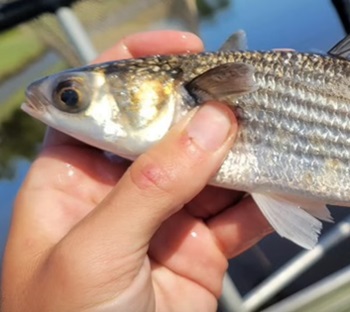 With three N.C. Marine Fisheries advisory committees set this week to make recommendations for changes in the striped mullet management plan, a trade and lobbying group for commercial fishermen is still saying tougher restrictions on the fishery are not needed. In an email Monday, Glenn Skinner, executive director of the Morehead City-based N.C. Fisheries Association said, “The most current DMF data and anecdotal reports from stakeholders seeing more mullet than have been seen in decades suggest that the striped mullet stock is rapidly expanding. “Yet,” Skinner added, “DMF has disregarded these obvious and undeniable signs of improvement and, once again, recommended draconian reductions that seem totally unnecessary when all relevant data is considered. more, >>click to read<< 13:35
With three N.C. Marine Fisheries advisory committees set this week to make recommendations for changes in the striped mullet management plan, a trade and lobbying group for commercial fishermen is still saying tougher restrictions on the fishery are not needed. In an email Monday, Glenn Skinner, executive director of the Morehead City-based N.C. Fisheries Association said, “The most current DMF data and anecdotal reports from stakeholders seeing more mullet than have been seen in decades suggest that the striped mullet stock is rapidly expanding. “Yet,” Skinner added, “DMF has disregarded these obvious and undeniable signs of improvement and, once again, recommended draconian reductions that seem totally unnecessary when all relevant data is considered. more, >>click to read<< 13:35
EDITORIAL: Commercial fishing avoids being gaffed one more time
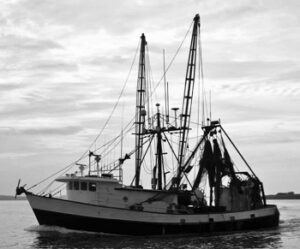 In August of 2020, almost three years before the date of the circuit court decision, a citizen’s lawsuit was filed against local shrimp trawl operators who regularly trawl for shrimp in Pamlico Sound. The plaintiffs argued that shrimp trawlers are violating the Clean Water Act by engaging in two type of unpermitted activity, “throwing bycatch (untargeted fish) overboard and disturbing sediment with their trawl net.” Named as defendants were local trawl owners who fortunately, with the help of outside support, were able to withstand the cost and time to defend themselves and by extension, the commercial fishing industry, during the three-year path of the lawsuit. >click to read< 08:15
In August of 2020, almost three years before the date of the circuit court decision, a citizen’s lawsuit was filed against local shrimp trawl operators who regularly trawl for shrimp in Pamlico Sound. The plaintiffs argued that shrimp trawlers are violating the Clean Water Act by engaging in two type of unpermitted activity, “throwing bycatch (untargeted fish) overboard and disturbing sediment with their trawl net.” Named as defendants were local trawl owners who fortunately, with the help of outside support, were able to withstand the cost and time to defend themselves and by extension, the commercial fishing industry, during the three-year path of the lawsuit. >click to read< 08:15
U.S. Appeals Court’s unanimous decision supports shrimp trawling in state sounds
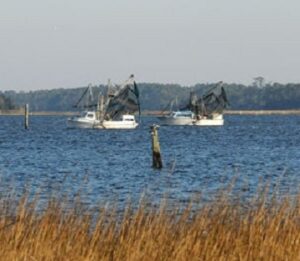 Commercial shrimpers in the state’s sounds received an overwhelming vote of confidence Monday, Aug. 7 with a unanimous decision by the 4th Circuit Court of Appeals affirming a lower court ruling dismissing complaints against shrimp trawling under the Clean Water Act. The plaintiffs contend that shrimp trawlers in Pamlico Sound are violating the Clean Water Act by engaging in two types of unpermitted activity, “throwing bycatch overboard and disturbing sediment with their trawl net. Glenn Skinner, executive director of the N.C. Fisheries Association which represents the state’s commercial fishing industry, noted that this lawsuit had far-reaching impact and could have, if approved, closed the commercial industry. The North Carolina shrimp fishery is immensely important to the state’s commercial watermen but also to the state’s economy. Much of the fishery is in Pamlico Sound and its tributaries. >click to read< 12:55
Commercial shrimpers in the state’s sounds received an overwhelming vote of confidence Monday, Aug. 7 with a unanimous decision by the 4th Circuit Court of Appeals affirming a lower court ruling dismissing complaints against shrimp trawling under the Clean Water Act. The plaintiffs contend that shrimp trawlers in Pamlico Sound are violating the Clean Water Act by engaging in two types of unpermitted activity, “throwing bycatch overboard and disturbing sediment with their trawl net. Glenn Skinner, executive director of the N.C. Fisheries Association which represents the state’s commercial fishing industry, noted that this lawsuit had far-reaching impact and could have, if approved, closed the commercial industry. The North Carolina shrimp fishery is immensely important to the state’s commercial watermen but also to the state’s economy. Much of the fishery is in Pamlico Sound and its tributaries. >click to read< 12:55
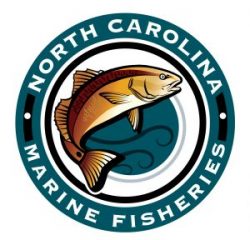
Fisheries commission to decide controversial amendments for striped bass, striped mullet plans
With the N.C. Marine Fisheries set to decide on two hotly debated fisheries management plan amendments – striped bass and striped mullet – later this week, the N.C. Fisheries Association has been urging its members to show up for the Emerald Isle meeting and weigh in. The estuarine striped bass amendment is set to be voted on during a session Thursday, Nov. 17 at 2 p.m., while the striped mullet vote is scheduled during a session that begins at 9 a.m. Friday, Nov. 18. Glenn Skinner, N.C. Fisheries Association urged the organization’s members to contact marine fisheries commissioners and attend the meeting to comment. >click to read< 15:08
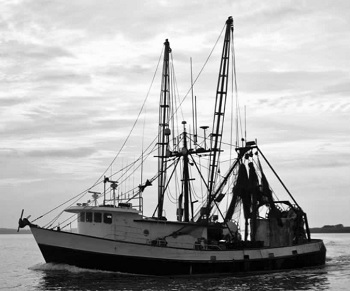
Norh Carolina: Commercial fishermen are not yet alarmed by court ruling
Although the N.C. Court of Appeals ruled Tuesday that the state can be sued for alleged failure to protect North Carolina’s fisheries, state officials and advocates for commercial fishermen are not yet alarmed. Glenn Skinner, executive director of the N.C. Fisheries Association, a trade and lobbying group for North Carolina commercial fishermen, said Tuesday it’s his understanding the appeals court verdict only rules that the CCA and its 86 individual plaintiffs have “standing,” which is the right to bring the suit. “This ruling was not based on factual evidence in the case, it just says it can move forward,” Skinner said. “We’re not shocked by this. >click to read< 13:36

North Carolina Fisheries Association Weekly Update for July 18, 2022
Does CPR Work on Fish? The Coastal Conservation Association Seems to Think SO! – After reading this title you’re probably envisioning a forty-pound Red Drum lying on the deck of a boat, straddled by an angler, receiving mouth to mouth followed by a round of rapid chest compressions, but that’s not the CPR I’m referring to. The CPR I’m talking about is the Coastal Conservation Association’s (CCA) Catch, Photo, and Release (CPR) Initiative. In Coastal States across the Country, including North Carolina, the CCA is holding CPR fishing tournaments where anglers can win big prizes for catching, photographing, and releasing numerous species of coastal finfish. The rules are simple, pay your entry fee, receive your wristband, catch a qualifying species of fish, photograph the fish lying on a ruler with your wristband visible, release the fish, and the longest fish or combination of fish wins. And of course, you have to be a CCA member to win! >click to read, to read all the updates >click here<, for older updates listed as NCFA >click here< 11:15

North Carolina Fisheries Association Weekly Update for May 30, 2022
Finally! An issue both the CCA and NCFA agree on. Do you believe in miracles? If not, you should. On May 25, at the meeting of the North Carolina Marine Fisheries Commission, David Sneed, Executive Director of the CCA NC, made the following statement during the public comment period. “On Southern Flounder, the recent recreational overages were the result of derby fishing brought about by insufficient management action from Amendment 2. Harvest and overage estimates that are provided by MRIP were never intended to be used to manage a fishery through a quota,,, Sound familiar? If you’re one of our regular readers it should. . >click to read<. To read all the updates >click here<, for older updates listed as NCFA >click here< 11:51

North Carolina Fisheries Association Weekly Update for May 16, 2022
NCWF…Sounds a lot like the CCA’s approach to messaging. Doesn’t it? A couple of weeks ago I had a call from a friend who is not a fisherman, recreational or commercial, but has taken an interest in fisheries management. He reached out to ask me about the North Carolina Wildlife Federation (NCWF), as he had seen them mentioned in several of our weekly newsletters but was having trouble finding their fisheries positions on the NCWF website. >click to read<. To read all the updates >click here<, for older updates listed as NCFA >click here< 09:41

North Carolina Fisheries Association Weekly Update for April 04, 2022
Over the last couple of months, many NC anglers have reached out to the NCFA seeking to get a better understanding of what’s really going on in the world of fisheries management here in North Carolina. That said, there have been several anglers who have questioned our assessment of the CCA’s true agenda, which in our opinion is to reduce or even eliminate harvest of wild fish stocks in both the commercial and recreational sectors. I had an angler from Pamlico County tell me that the CCA had assured him that once the nets were gone recreational bag limits for Red Drum, Southern Flounder, and Speckled Trout would increase and nothing I write could convince him otherwise. This got me thinking that maybe he and other anglers would be more receptive to the truth if someone else wrote it. >click to read the attached article< 16:40
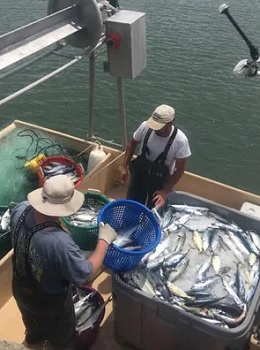
“We’re in pretty bad shape,” Commercial fishermen, fishing industry decline over the past 20 years
North Carolina commercial fishermen have complained for decades that government regulations and a variety of other factors threaten their livelihood and have them headed the way of endangered species. Glenn Skinner of Newport, executive director of the North Carolina Fisheries Association an advocacy group of commercial fishermen, said statistics back that up. “These declines are the result of many different factors. with regulations, the fear of future regulations or outright bans on commercial fishing gears being a significant factor,” Skinner said. He said public perception and political agendas drive the regulations. >click to read< 11:26
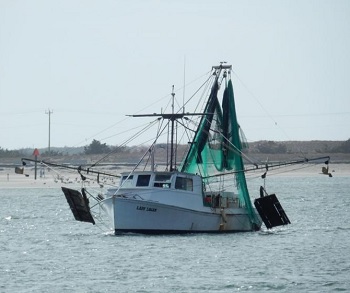
Proposed net ban, restriction referendum raises concern among commercial fishing advocates
A proposed referendum for net bans and restrictions missed the state legislature’s crossover deadline, but its very introduction has caused alarm among some commercial fishing officials. State Rep. Bill Richardson, D-Cumberland, introduced House Bill 513,,, the fact it was proposed was enough to spark concern with commercial fishing advocates and a local marine biologist. N.C. Fisheries Association Executive Director and commercial fisherman Glenn Skinner and Crystal Coast Ecotours owner and operator Jess Hawkins have voiced their opposition. >click to read< 11:29

North Carolina Fisheries Association Weekly Update for March 05, 2021
Legislative updates, Bill updates, Calendar, Recently many legislators received an email from Allen Jernigan about his frustrations with fisheries management in our state. Glenn Skinner, NCFA’s Executive Director, went through Mr. Jernigan’s email point by point and offers this response to help clarify some really bad information. Mr. Jernigan’s comments are in black and NCFA’s in red. (read it in the update) >Click here to read the Weekly Update<, to read all the updates, >click here<, for older updates listed as NCFA >click here< 11:42

North Carolina Fisheries Association sends aid to Louisiana fishermen, seafood dealers
The N.C. Fisheries Association, a nonprofit dedicated to promoting the state seafood industry, announced in a press release Tuesday it recently sent several pallets of seafood and bulk ice to Louisiana to assist in relief efforts from Hurricane Laura, which made landfall in that state in late August. In an email to the NCFA from Louisiana Fine Food Companies President and CEO Jim Gossen, Mr. Gossen thanked the association and its partners for their assistance. “Thanks for everything your fishermen have done to help us here,” Mr. Gossen said. “Make sure you let them know how much help they’ve been on the western side of the state (of Louisiana).” According to the NCFA release, Mr. Cross called NCFA Executive Director Glenn Skinner and suggested the organization get involved with the relief effort. >click to read< 08:17
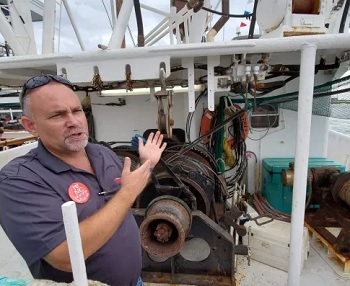
Anti-Commercial Fishing Lawsuit demands NC coastal fishing reforms
The N.C. Coastal Fisheries Reform Group, a nonprofit organization, has said the degradation of marine fisheries is the most significant environmental issue facing the state, and it is going to court to seek change. Joe Albea, a spokesman for the organization, said that “vast schools of croaker and gray trout all over North Carolina in the sounds and along the beach” were present in the 1970s and ’80s. “Through the years we have lost those great schools of fish,” he said. Brent Fulcher, whose fishing vessel, the Micah Bell, is named as a defendant“,, Glenn Skinner, executive director of the trade group the N.C. Fisheries Association, believes the lawsuit is without merit. >click to read< 14:44

Always NC Fresh! NC Commercial Fishing Resource Fund Launches New Campaign, NCFA Weekly Update for May 22, 2020
Glenn Skinner, Executive Director of NC Fisheries Association (NCFA) and NCCFRF Committee Member, stated, “The Always NC Fresh public relations campaign could not have come at a better time as many of our fishermen have been hit hard by the impacts of COVID-19.” Skinner added, “Commercial fishing has been a part of North Carolina’s coastal communities and economy for hundreds of years, and it was time for us to reintroduce our fishermen to the citizens of this great state. We have a great story to tell and we’re proud to be a part of this new campaign.” “Commercial fishermen are good people who are a fundamental part of the economy and way of life in North Carolina’s coastal communities,” said Brent Fulcher, NCFA Chairman. >click to read< 08:04
North Carolina Fisheries Association Weekly Update for May 22, 2020 – >click to read< to read all the updates >click here<, for older updates listed as NCFA >click here<

North Carolina: Upon further exploration of the matter, Spanish Mackerel fishery to reopen!
On September 10, 2019, I wrote you denying your request to have DMF issue a proclamation,,, Upon further exploration of the matter,,, Secretary Regan letter about Spanish Mackerel, Attached please find a letter from Secretary Michael Regan to Glenn Skinner concerning the Spanish Mackerel fishery. Mackerel harvest will reopen with a 500 pound daily trip limit sometime next week! Please stop calling Secretary Regan, Director Murphey and DMF staff on this issue, with thanks to those who took the time to call., >click to read < 22:45

North Carolina Fisheries Association Weekly Update for August 09, 2019
Legislative updates, Bill updates, Calendar, >Click here to read the Weekly Update<, to read all the updates >click here<, for older updates listed as NCFA >click here< From Our Executive Director – Glenn Skinner, The NCFA will be hold a meeting Thursday, August 15 from 3-6pm at the Fairfield Inn & Suites by Marriott located at 2090 W.15th Street, Washington, NC to discuss the proposed changes to the Southern Flounder FMP.,,, This issue is very important and we encourage everyone involved in the Flounder fishery to attend 11:04
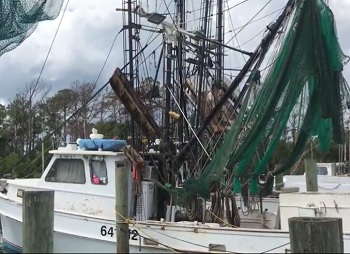
North Carolina: Petition seeks to introduce new rules to commercial fishing industry
A petition by the North Carolina Wildlife Federation (NCWF) could have a major impact on the commercial fishing industry. The petition seeks to:
Limit shrimpers workweek from five days (Monday-Friday) to three (Monday, Wednesday, Friday). To designate areas as shrimp trawl management areas. Reduce the size of nets allowed and restrict gear in these newly designated areas. The federation says the reason for the petition is to reduce the amount of by-catch. By-catch is the anything in the net that’s not your intended species. It’s common for shrimpers to catch juvenile fish in their nets while shrimping. >click to read< 12:07
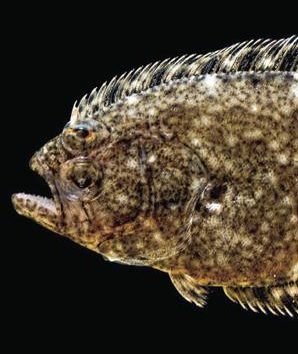
N.C. Division of Marine Fisheries: southern flounder ‘overfished’; harvest cuts in works
State fisheries managers have released a new overview of commercially important fish stocks, and a commercial fishing advocacy group and the state branch of a recreational fishing conservation nonprofit seem supportive of its results.,, fisheries managers are working on Amendment 2 to the Southern Flounder Fishery Management Plan. This amendment, if the N.C. Marine Fisheries Commission adopts it at its meeting Wednesday through Friday, Aug. 21-23 in Raleigh, would implement measures to reduce both the commercial and recreational harvest by 62-72%. N.C. Fisheries Association President and commercial fisherman Glenn Skinner said,,, <click to read< 09:39
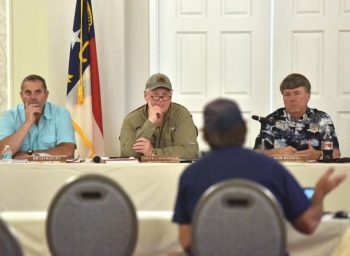
North Carolina: After public input, panel leans toward Southern flounder harvest reduction
State fisheries managers plan to reduce the harvest of southern flounder – commercial and recreational – by 62-72% to address problems with the spawning stock.,, met to select preferred management options for Southern Flounder Fishery Management Plan Amendment 2,,, N.C. Fisheries Association Executive Director Glenn Skinner said he’s been talking with commercial fishermen,,, “Their concern is when it will happen this year,” he said. “We’d ask you to do it in December. We need (the flounder harvest) this year. A lot of people still have hurricane damage. We need to be able to reinvest in the industry. Reductions have been made before (to the flounder harvest). They may not have been enough.”>click to read<09:26
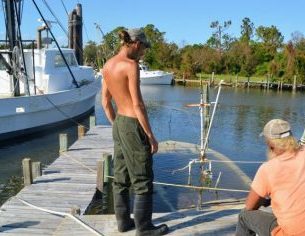
N.C. Fishermen brace for a difficult winter financially after the hurricane ruined much of their fall catch.
During a major hurricane, fish migrate away, oysters get contaminated and shrimp are blown to sea, scattered to deeper waters. Though sometimes unnoticed, the seafood industry takes a big hit after storms like Florence. Not only does the crop move, but fishermen often live and work in the coastal communities that take the brunt of the storm’s rage. “We get overlooked real easy. We are isolated to the coast. And unlike the agricultural industry, this affects everyone,” said Glenn Skinner, executive director of the North Carolina Fisheries Association. “Everyone who fishes is affected by this.” Their boats, gear, docks and packing houses take a blow. >click to read<20:33
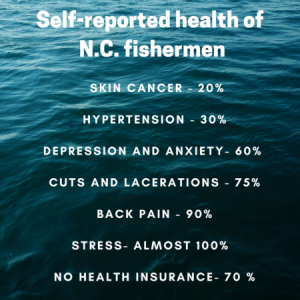
Many are injured on the job, most lack health insurance. Meet the cowboys of the sea.
North Carolina fishermen work long hours, and many fish alone. When harvesting shrimp, they can stay out on the water four to five days at a time. Broken bones and lacerations are common. Fishermen are disproportionately affected by skin cancer. The majority complain of back pain. Other lose limbs, even as many don’t have health insurance. Some die by drowning. One hurricane or unexpected cold front can move their crop. The stakes are high. But they don’t think about these things much and they didn’t see why a health care reporter was interested in talking to them, even as they admitted health care concerns have changed how many approached their fishing careers. For Glenn Skinner, 45, fishing is freedom. It’s in his blood. He’s a fourth generation fisherman from Carteret County and has been on fishing boats since he was 4 years old. >click to read<09:04






